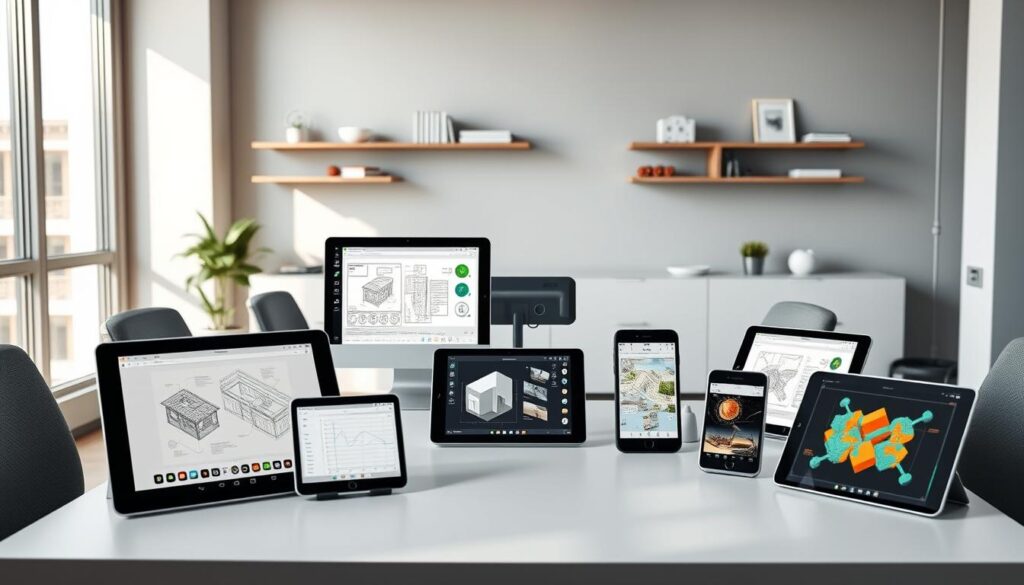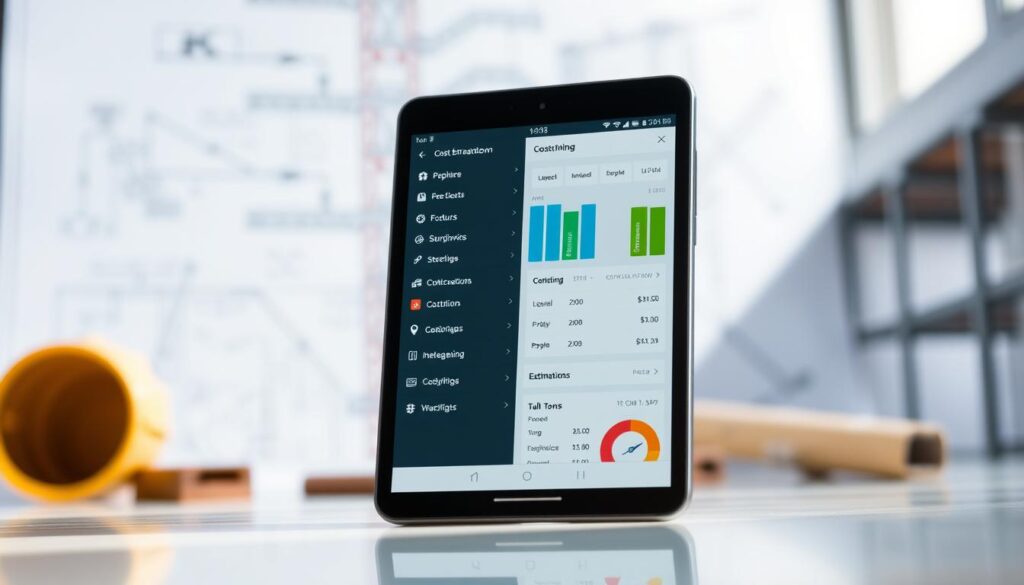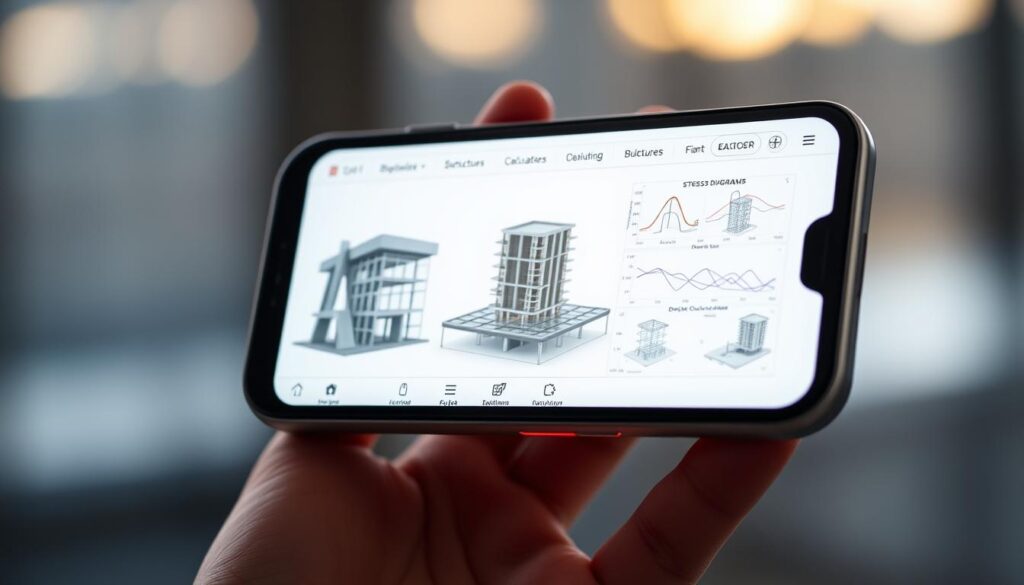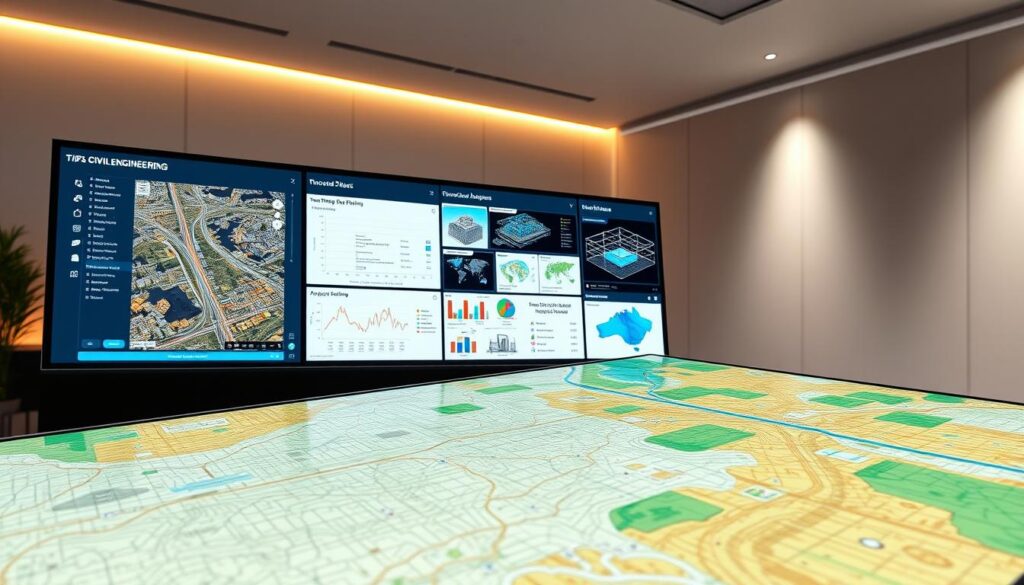Are you leveraging the power of technology to stay ahead in the civil engineering game? With the rapid evolution of civil engineering apps, professionals can now streamline project management, enhance collaboration, and access critical data on the go.
The field of civil engineering has witnessed a significant transformation with the advent of innovative mobile solutions. These tools not only boost productivity but also provide real-time insights, enabling professionals to make informed decisions.
Key Takeaways
- Discover the most effective civil engineering apps for project management.
- Learn how these apps can enhance collaboration and productivity.
- Explore the best tools for surveying, design, and compliance.
- Understand how top mobile apps can improve real-time data access.
- Find out which apps are most suitable for your specific needs.
The Importance of Mobile Apps in Civil Engineering
Mobile apps have become indispensable tools for civil engineers, revolutionizing project management and execution. These apps have transformed the way civil engineers work, providing them with the necessary tools to manage projects more efficiently.
Enhancing Efficiency and Productivity
Mobile apps designed for civil engineers significantly enhance efficiency and productivity. By allowing engineers to focus on critical tasks, automate routine processes, and make informed decisions based on real-time data, these apps streamline the project workflow. For instance, apps that provide real-time monitoring and updates enable engineers to address issues promptly, reducing delays and improving overall project efficiency.
Streamlining Project Management
Project management is another area where mobile apps have made a significant impact. Top-rated apps for construction professionals offer features such as task assignment, progress tracking, and collaboration tools. These features ensure that projects are completed on time and within budget. By streamlining project management tasks, mobile apps help reduce administrative burdens, allowing engineers to concentrate on the technical aspects of their projects.
The integration of mobile apps in civil engineering not only improves the way projects are managed but also enhances the overall quality of the work. By leveraging the best apps for civil engineers, professionals in the field can achieve better outcomes, improve client satisfaction, and maintain a competitive edge in the industry.
Essential Features for Civil Engineering Apps
Civil engineering apps must have certain critical features to enhance productivity and efficiency in projects. These features are crucial for ensuring that the apps meet the complex needs of civil engineering professionals.

User-Friendly Interface
A user-friendly interface is vital for any civil engineering app. It ensures that users can navigate the app easily, regardless of their technical background. An intuitive design helps in reducing the learning curve, allowing engineers to focus on their work rather than figuring out how to use the app.
Collaboration Tools
Collaboration tools are essential for team-based projects. These tools enable multiple stakeholders to work together seamlessly, share information, and track changes in real-time. Features like real-time commenting, file sharing, and task assignment are critical for effective collaboration.
Offline Capabilities
For civil engineers working in the field, offline capabilities are a necessity. These capabilities allow users to access and update data even without internet connectivity. This feature is particularly useful for site inspections, data collection, and other fieldwork activities where internet access may be limited.
By incorporating these essential features, civil engineering apps can significantly improve project outcomes. They enhance productivity, facilitate collaboration, and ensure that data is accessible when needed.
Top Mobile Apps for Project Management
The use of mobile apps in project management has revolutionized the civil engineering industry by providing tools that enhance collaboration and productivity. These apps enable project managers to track progress, manage documents, and collaborate with team members in real-time.
Procore
Procore is a comprehensive project management app that offers a wide range of tools for construction professionals. It allows users to manage projects, track progress, and collaborate with team members. Key features include project scheduling, document management, and real-time reporting.
“Procore has been a game-changer for our construction projects, enabling us to manage complex tasks more efficiently.” – Construction Manager
PlanGrid
PlanGrid is another top-rated app that focuses on construction productivity and collaboration. It provides a platform for field and office teams to share plans, track progress, and manage issues. Its user-friendly interface and robust features make it an essential tool for civil engineering projects.
Buildertrend
Buildertrend is a construction management software that offers a mobile app for project management on-the-go. It includes features such as project scheduling, budgeting, and customer management. Buildertrend helps contractors streamline their operations and improve customer satisfaction.
These top mobile apps for project management have transformed the civil engineering industry by providing efficient solutions for complex project management tasks. By leveraging these tools, civil engineers can enhance collaboration, improve productivity, and deliver projects on time.
Best Mobile Apps for Design and Drafting
The best mobile apps for design and drafting have revolutionized the civil engineering field, offering powerful tools on-the-go. These apps enable engineers to create, view, and modify designs anywhere, anytime, significantly enhancing productivity and collaboration.
AutoCAD Mobile App
The AutoCAD Mobile App is a robust tool that allows users to view, edit, and share CAD drawings on mobile devices. Its key features include:
- Drawing Editing: Edit DWG files with precision, using familiar AutoCAD commands.
- Markup and Annotation: Add comments and markups to drawings, facilitating collaboration.
- Sharing and Collaboration: Share designs with stakeholders and team members in real-time.
SketchUp Viewer
SketchUp Viewer is a powerful app for viewing and presenting 3D models. Its main features include:
- 3D Model Viewing: View complex 3D models with ease, using intuitive navigation controls.
- Measurement Tools: Take precise measurements within the model, aiding in analysis and planning.
- Sectioning and Clipping: Slice models to inspect internal details, enhancing understanding and communication.

Revit Live
Revit Live allows users to explore Revit models in a real-time 3D environment. Key benefits include:
- Immersive Experience: Engage with designs in a fully immersive 3D environment, enhancing comprehension.
- Real-time Navigation: Navigate through models in real-time, facilitating design review and analysis.
- Collaboration: Share and present designs to stakeholders, improving communication and feedback.
These top-rated apps for construction professionals not only streamline design and drafting processes but also improve project outcomes by enhancing collaboration and productivity.
| App | Key Features | Benefits |
|---|---|---|
| AutoCAD Mobile App | Drawing editing, markup, and sharing | Enhanced collaboration, precision editing |
| SketchUp Viewer | 3D model viewing, measurement tools | Improved analysis, precise measurements |
| Revit Live | Immersive 3D experience, real-time navigation | Enhanced comprehension, improved collaboration |
Popular Apps for Surveying and Mapping
Mobile apps have transformed the way civil engineers approach surveying and mapping, offering unprecedented levels of precision and efficiency. Surveying and mapping are critical tasks in civil engineering, requiring accurate data collection and analysis. Several mobile apps have made these processes more efficient by providing advanced features such as GPS connectivity, data collection, and mapping.
Leica Captivate
Leica Captivate is a powerful app designed for surveyors and engineers. It offers a range of features including advanced GPS capabilities, intuitive data capture, and comprehensive reporting tools. The app’s ability to work offline is particularly useful in areas with limited internet connectivity.
“Leica Captivate has revolutionized the way we conduct surveys, providing accurate data in real-time and streamlining our workflow.” – Surveyor’s Review
Trimble Access
Trimble Access is another highly-regarded app in the field of surveying and mapping. It provides users with the ability to collect and manage data efficiently, utilizing a range of Trimble’s GNSS and robotic total stations. The app’s flexibility and customization options make it a favorite among professionals.
| Feature | Leica Captivate | Trimble Access |
|---|---|---|
| GPS Capability | Advanced GNSS | GNSS and Robotic Total Stations |
| Data Capture | Intuitive Data Capture | Efficient Data Collection |
| Offline Capability | Yes | Yes |
ArcGIS Mobile
ArcGIS Mobile is part of the Esri suite of GIS (Geographic Information System) tools, offering a comprehensive platform for mapping and spatial analysis. The app allows users to access and edit GIS data in the field, providing real-time insights and updates.
These apps have significantly impacted the field of surveying and mapping, enhancing the work of civil engineers by providing them with the tools needed for accurate and efficient data collection and analysis.
Construction Estimating and Budgeting Apps
In the realm of civil engineering, mobile apps are playing a pivotal role in enhancing the accuracy and efficiency of construction estimating and budgeting processes.
These apps have become indispensable tools for contractors and project managers, enabling them to create detailed estimates, track expenses, and manage budgets effectively. By leveraging mobile technology, civil engineers can ensure that their projects are financially viable and executed within budget.
Sage Construction and Real Estate
Sage Construction and Real Estate offers a comprehensive suite of construction management solutions, including estimating and budgeting tools. This app allows users to create detailed estimates, track costs, and manage project finances in real-time.
With its robust features, Sage Construction and Real Estate helps contractors stay on top of their projects, ensuring that they remain within budget and on schedule.
CoConstruct
CoConstruct is another leading app in the construction estimating and budgeting space. It provides a range of tools that enable contractors to manage their projects more effectively, from initial estimates to final invoicing.
CoConstruct’s intuitive interface and powerful features make it an ideal choice for contractors looking to streamline their estimating and budgeting processes.
ProEst
ProEst is a construction estimating app that offers advanced features for creating detailed estimates and managing project costs. With its user-friendly interface, ProEst makes it easy for contractors to generate accurate estimates and stay within budget.
ProEst’s capabilities extend to managing change orders, tracking expenses, and analyzing project profitability, making it a valuable tool for civil engineers and contractors alike.

By adopting these mobile apps, civil engineers and contractors can significantly improve their estimating and budgeting processes, leading to more successful project outcomes.
Apps for Compliance and Safety Management
In the realm of civil engineering, ensuring compliance and safety is paramount, and there are several mobile apps designed to support these needs. These apps have become indispensable tools for project managers and engineers to maintain high standards of safety and compliance on construction sites.
Several top-rated apps are available for compliance and safety management, each offering unique features that cater to the diverse needs of civil engineering projects. Some of the most notable apps include:
SafetyCulture (iAuditor)
SafetyCulture, formerly known as iAuditor, is a powerful app that enables users to conduct safety audits and inspections. It allows for the creation of custom checklists, capturing of photos and videos as evidence, and generation of reports in real-time. This app is particularly useful for identifying potential hazards and ensuring compliance with safety regulations.
PlanGrid Safety
PlanGrid Safety is another highly-regarded app that focuses on safety management. It provides a platform for reporting incidents, near-misses, and hazards, and allows for the assignment of corrective actions. The app also enables the tracking of safety observations and the management of safety-related documents, ensuring that all safety protocols are followed.
Procore Safety Management
Procore Safety Management is a comprehensive tool that integrates safety management into the broader project management workflow. It offers features such as safety observations, incident reporting, and safety training management. By using Procore Safety Management, project managers can ensure that safety is integrated into every aspect of the project.
These apps are among the top-rated apps for construction professionals, and their adoption can significantly enhance compliance and safety management in civil engineering projects. By leveraging these tools, professionals can ensure a safer working environment and reduce the risk of non-compliance.
Top Apps for Structural Analysis and Design
Mobile technology has given rise to powerful apps that simplify complex structural analysis and design tasks for civil engineers. These apps enable professionals to perform detailed analyses, design structures, and review results on their mobile devices, enhancing productivity and efficiency.

RISA
RISA offers a comprehensive suite of tools for structural analysis and design. Its mobile app allows engineers to perform complex calculations, model structures, and analyze results on the go. The app’s intuitive interface and powerful features make it an indispensable tool for civil engineers.
SAP2000 Mobile
SAP2000 Mobile is designed to provide flexibility and convenience for engineers working on structural projects. The app allows users to view and analyze models, run analyses, and review results directly on their mobile devices. Its compatibility with various file formats ensures seamless integration with existing workflows.
ETABS
ETABS is a robust tool for structural analysis and design, offering advanced features for modeling, analysis, and design. The ETABS mobile app extends these capabilities to mobile devices, enabling engineers to access critical project information and perform analyses from anywhere.
These top apps for structural analysis and design have transformed the way civil engineers work, providing the flexibility and power needed to tackle complex projects efficiently. By leveraging these tools, engineers can improve their productivity, reduce project timelines, and enhance overall quality.
Mobile Apps for Communication and Collaboration
Civil engineering projects rely heavily on seamless communication and collaboration among team members. Effective use of mobile apps can significantly enhance these aspects, ensuring that projects are executed efficiently and collaboratively.
The importance of communication in civil engineering cannot be overstated. With teams often spread across different locations, mobile apps have become indispensable tools for facilitating real-time communication and collaboration.
Slack
Slack is a popular communication platform that allows teams to create channels for different topics, share files, and integrate with other tools. Its mobile app enables civil engineers to stay connected and informed on the go.
“Slack has revolutionized the way our team communicates. We can easily share updates and files, and it’s much more organized than email.”
Microsoft Teams
Microsoft Teams is another powerful tool for team communication and collaboration. It integrates seamlessly with other Microsoft Office applications, making it a favorite among teams already using Microsoft products.
- Real-time chat and video conferencing
- File sharing and collaboration
- Integration with Microsoft Office
Trello
Trello is a project management tool that uses boards, lists, and cards to organize tasks. It’s highly visual and flexible, making it suitable for a variety of civil engineering projects.
| Feature | Slack | Microsoft Teams | Trello |
|---|---|---|---|
| Primary Use | Communication | Communication & Collaboration | Project Management |
| Integration | Many third-party apps | Microsoft Office | Various project management tools |
These mobile apps have transformed the way civil engineering teams work together, enhancing productivity and ensuring that projects are completed on time.
GIS and Mapping Tools for Civil Engineers
Geographic Information System (GIS) and mapping tools have become indispensable in civil engineering, enabling professionals to analyze and visualize complex geospatial data. These tools are crucial for planning infrastructure projects, managing environmental data, and making informed decisions.

The use of GIS and mapping tools has become widespread in civil engineering due to their ability to provide valuable insights into geospatial data. Google Earth Pro, QGIS, and Mobile GIS Apps are among the leading tools used for GIS and mapping.
Google Earth Pro
Google Earth Pro is a powerful tool that allows civil engineers to visualize and analyze geospatial data in a 3D environment. It provides high-resolution imagery and terrain data, making it ideal for planning and designing infrastructure projects.
QGIS
QGIS is an open-source GIS application that offers a wide range of features for analyzing and visualizing geospatial data. It supports various data formats and provides advanced tools for spatial analysis, making it a popular choice among civil engineers.
Mobile GIS Apps
Mobile GIS Apps have become increasingly popular due to their ability to collect and analyze geospatial data in the field. These apps enable civil engineers to capture accurate data and make informed decisions on-site.
In conclusion, GIS and mapping tools like Google Earth Pro, QGIS, and Mobile GIS Apps are essential for civil engineers. They provide valuable insights into geospatial data, enabling professionals to plan infrastructure projects, manage environmental data, and make informed decisions.
The Role of Augmented Reality in Civil Engineering
With the advent of augmented reality, civil engineers can now visualize and interact with project designs in real-time, enhancing the precision and efficiency of civil engineering projects.
Augmented Reality (AR) is increasingly being adopted in civil engineering to improve project visualization, accuracy, and overall process efficiency. By overlaying digital information onto the real world, AR enables engineers to better understand complex designs and identify potential issues early on.
Revolutionizing Design and Construction
Several top-rated apps are leveraging AR technology to transform the civil engineering landscape. These include:
- ARki: A powerful tool for visualizing and interacting with building information models (BIM) in augmented reality.
- SiteScout: Utilizes AR to enhance construction site management, allowing for real-time monitoring and issue detection.
- Magicplan: An app that uses AR to create detailed floor plans and reports, streamlining the surveying process.
These apps not only improve the accuracy of designs and constructions but also enhance collaboration among stakeholders by providing a shared understanding of project details.
Benefits of AR in Civil Engineering
The integration of AR in civil engineering offers numerous benefits, including:
| Benefit | Description |
|---|---|
| Enhanced Visualization | AR allows engineers to visualize complex designs in the real world, improving understanding and reducing errors. |
| Improved Accuracy | By overlaying digital information onto physical environments, AR enhances the accuracy of site surveys and constructions. |
| Increased Efficiency | AR streamlines processes such as design review, site monitoring, and reporting, saving time and resources. |
As AR technology continues to evolve, its role in civil engineering is expected to expand, driving further innovations and improvements in the field.
Future Trends in Mobile Technology for Civil Engineering
As we look ahead, mobile applications for civil engineering projects are set to revolutionize the industry through AI integration and enhanced collaboration tools. The future of civil engineering is closely tied to the advancements in mobile technology, enabling professionals to manage projects more efficiently.
AI Integration
The integration of Artificial Intelligence (AI) in mobile apps is transforming the civil engineering landscape. AI algorithms can analyze vast amounts of data, predict potential issues, and automate routine tasks, thereby increasing productivity and reducing errors. For instance, AI-powered apps can help in predictive maintenance, identifying potential structural issues before they become critical.
Some of the key benefits of AI integration in civil engineering apps include:
- Enhanced data analysis capabilities
- Predictive modeling for project outcomes
- Automation of repetitive tasks
| AI Feature | Benefit | Example App |
|---|---|---|
| Predictive Maintenance | Identifies potential issues before they become critical | SAP2000 Mobile |
| Data Analysis | Enhances decision-making with detailed insights | RISA |
| Task Automation | Reduces manual labor and increases efficiency | Procore |
Increased Cloud Collaboration
Cloud collaboration is another significant trend shaping the future of mobile technology in civil engineering. By providing a centralized platform for data sharing and project management, cloud-based apps enhance teamwork and drive efficiency. Real-time collaboration enables teams to work together seamlessly, regardless of their location.
The benefits of increased cloud collaboration include:
- Improved communication among team members
- Real-time updates and tracking
- Enhanced data security and backup

As mobile technology continues to evolve, the integration of AI and cloud collaboration will play a pivotal role in shaping the future of civil engineering. By adopting these trends, civil engineers can improve project outcomes, enhance productivity, and stay ahead in a competitive industry.
Final Thoughts on Choosing the Right Apps
Civil engineering professionals must carefully evaluate their needs to maximize productivity and efficiency. With numerous civil engineering apps available, selecting the right tools is crucial for project success.
Evaluating Project Requirements
To choose the most effective must-have mobile apps for civil engineers, consider the specific demands of your projects. Assess the features and functionalities required to streamline your workflow, enhance collaboration, and drive project success.
Integrating Multiple Tools
Combining multiple civil engineering apps often yields the best results, as different tools cater to different aspects of civil engineering projects. By strategically integrating these apps, professionals can improve their workflow, enhance collaboration, and drive project success.
By understanding your needs and leveraging the right combination of civil engineering apps, you can significantly enhance your project’s outcome. Explore the various must-have mobile apps for civil engineers to find the perfect fit for your projects.
